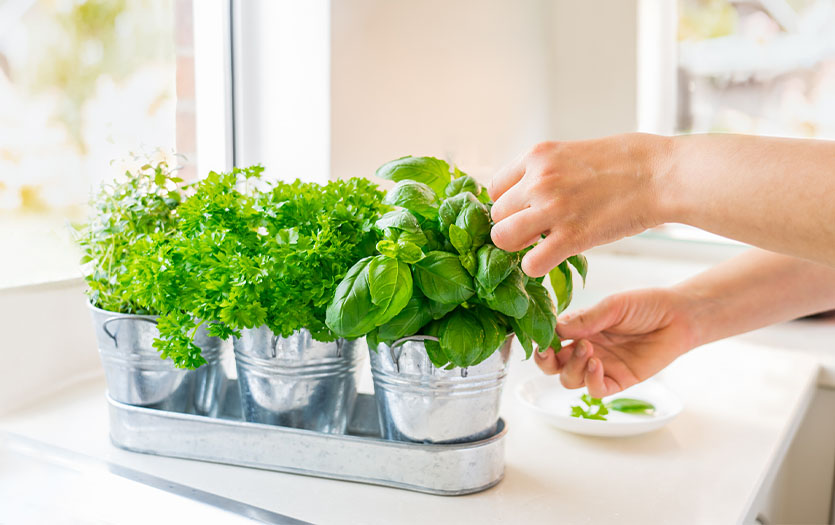
This post was written by Caitlyn Bauer, MS, RD, LS, clinical dietitian, Parkview Noble Hospital, Parkview Noble Center for Healthy Living.
Herbs are known around the world for their culinary use and health benefits. These small but powerful additions are essential for delivering bursts of flavor and fragrance to your favorite dishes. In addition, herbs can provide potential health benefits, such as easing a stomachache and boosting immunity against ailments like the common cold. There are so many good reasons to explore herbs as part of a healthy lifestyle.
Keeping the integrity of the herb
Herbs are defined as “any plant with leaves, seeds or flowers used for flavoring, food, medicine or perfume.” This broad definition incorporates a long list of foods that we eat every day, but herbs are primarily classified in two ways: robust and fine.
Robust herbs are bold in flavor, often used alone in a dish or with a few others and stand up well to heat. This category would include:
- Rosemary
- Thyme
- Sage
- Garlic
Fine herbs mix well with others and become milder when cooked. Because of this, they are often added towards the end of the cooking process or consumed raw, as in salad toppers. Herbs in this category include:
- Dill
- Parsley
- Basil
Herbs can be used fresh or dried in culinary practices. Visit the Purdue Extension website or contact a Master Gardener for more information on growing, drying or using herbs.
Highlighting the benefits of herbs
Herbs give us few calories but can have positive impacts on our health. Below, you’ll find just some of the benefits believed to be derived from this category of plants, but research is giving us more insights all the time.
- Ginger has been used to help with feelings of nausea and gastrointestinal issues and can be used in dishes when cooking or as a tea.
- Peppermint is a versatile herb that improves digestion, has antibacterial effects and has respiratory benefits for opening nasal passages.
- Cumin has been touted to help with weight loss, stress and lowering cholesterol levels.
- Turmeric (aka curcumin) has been shown to have anti-inflammatory and antioxidant properties- and has been the most researched.
- Echinacea targets the immune system and helps with the common cold, upper respiratory infection, influenza and ear infections to name a few.
- Cinnamon is being researched for its benefits in reducing blood glucose levels, but the results have been inconclusive and need more studies. It also shows a cognitive enhancement effect.
- Oregano comes with a powerful taste and benefits for supporting a healthy immune system, reducing inflammation, regulating blood glucose, improving insulin resistance and helping reduce pain during menstrual cramps.
- Parsley contains carotenoids and other vitamins that support a healthy body and immune system.
There’s so much to gain from these flavorful add-ins. Go on, get creative with herbs!



